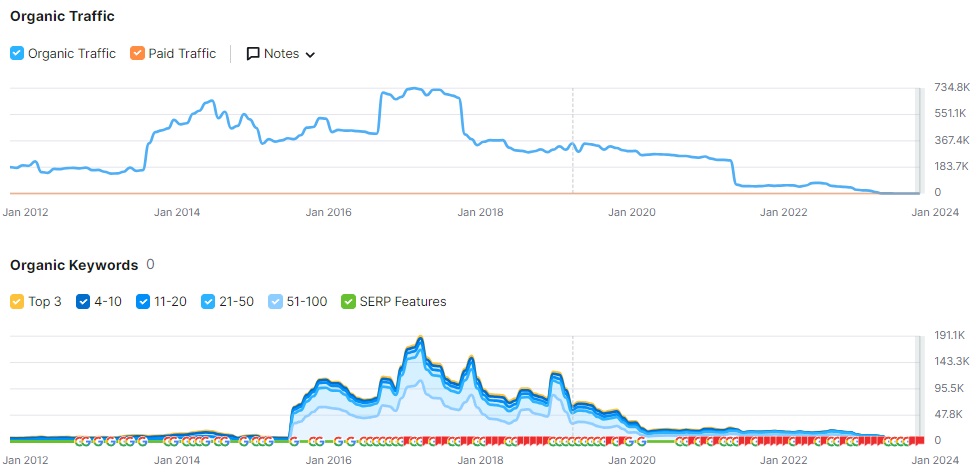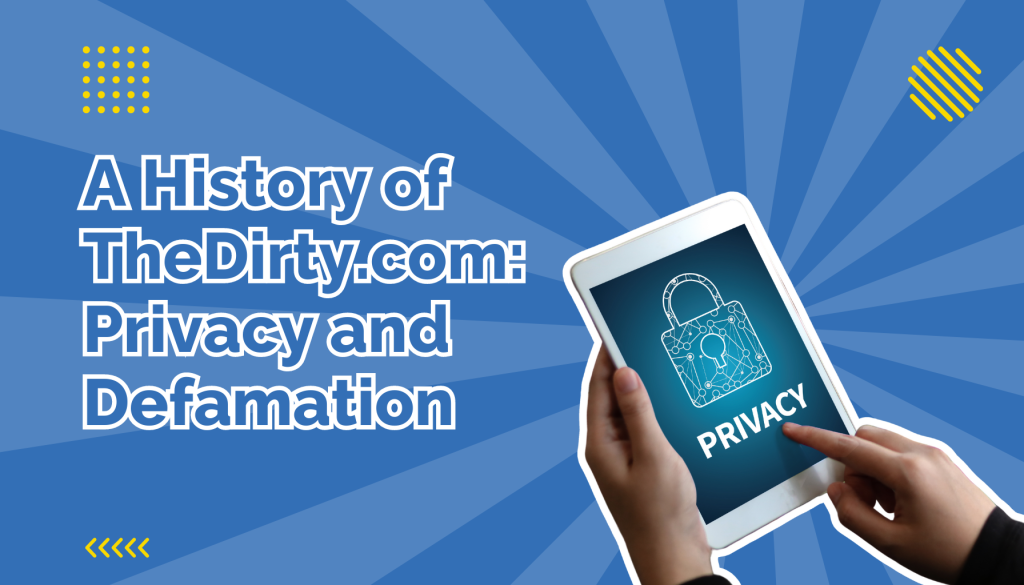A History of TheDirty.com
TheDirty.com is a website known for its controversial content, often involving gossip, accusations, and personal information about individuals. It was founded by Nik Richie in 2007. The site allows users to submit posts about other individuals, which often include allegations or rumors about their personal lives, relationships, and behaviors. The content on TheDirty.com has been the subject of much debate and legal scrutiny.
One of the key aspects of TheDirty.com is its focus on user-submitted content, which has raised questions about privacy, defamation, and the responsibility of website operators for user-generated content. The site has been involved in several legal cases, particularly around issues of defamation and the limits of free speech online. In some cases, individuals featured on the site have sued for defamation, claiming that the posts about them were false and damaging to their reputations.
The legal battles involving TheDirty.com have also brought attention to the Communications Decency Act (CDA), particularly Section 230, which provides immunity to website operators from liability for user-submitted content. The site’s defense in many lawsuits has been based on this provision, arguing that it is not responsible for the content posted by its users.
The site’s content and business model have been widely criticized for promoting cyberbullying and invasion of privacy. Critics argue that the site encourages negative and harmful behavior, allowing users to anonymously post damaging rumors and allegations about others without accountability.
Despite these controversies, TheDirty.com maintained a significant online presence and has a dedicated user base. It represents a notable example of the challenges and ethical considerations in moderating user-generated content on the internet, especially content that walks the line between free speech and harmful speech.
TheDirty.com Lawsuits
TheDirty.com, known for its user-submitted gossip and controversial content, has been embroiled in several high-profile lawsuits that highlight the complex legal issues surrounding internet speech and the responsibility of website publishers for user-generated content. These lawsuits primarily focus on defamation claims and the applicability of legal protections under the Communications Decency Act (CDA), specifically Section 230.
- Jones v. Dirty World Entertainment Recordings LLC (2013): This is one of the most notable cases involving TheDirty.com. Sarah Jones, a former Cincinnati Bengals cheerleader and high school teacher, sued the website and its founder, Nik Richie, after two posts appeared on the site in 2009 alleging she had sexually transmitted diseases and had relationships with team members. Jones argued that the posts were defamatory and false. In 2013, a Kentucky federal jury found TheDirty.com liable for defamation, awarding Jones $338,000 in damages. This verdict was significant because it challenged the usual protections websites have under Section 230 of the CDA, which typically shields website operators from liability for user-posted content. However, in 2014, the Sixth Circuit Court of Appeals overturned the verdict, ruling that TheDirty.com was protected under Section 230, emphasizing that website operators are not liable for content posted by third parties, even if they exercise some editorial control.
- Other Defamation Cases: Over the years, several individuals have filed defamation lawsuits against TheDirty.com for posts that they claimed were false and damaging to their reputations. These cases often centered around the site’s responsibility for user-submitted content and whether Nik Richie and his website should be considered publishers or simply hosts of third-party content. Many of these cases have been dismissed or settled out of court, with the courts generally upholding the protections afforded by Section 230.
- Legal and Ethical Discussions: The lawsuits against TheDirty.com have sparked wider legal and ethical debates about internet speech, privacy, and the balance between protecting online platforms from liability and holding them accountable for harmful content. While Section 230 of the CDA has been pivotal in allowing the internet to flourish by protecting websites from the actions of their users, cases like those involving TheDirty.com raise questions about how these protections should be applied, especially when sites appear to encourage or profit from salacious or harmful content.
In summary, the lawsuits against TheDirty.com have played a significant role in shaping the legal landscape regarding online speech and publisher liability. They underscore the ongoing challenges in regulating internet content and balancing the rights of individuals with the principles of free speech and innovation.
What Happened to TheDirty.com?
The decline in TheDirty.com’s online visibility and traffic, particularly noticeable from mid-2023 to January 2024, can be attributed to a combination of internal changes, legal challenges, and significant shifts in Google’s search algorithms. These elements collectively influenced the site’s standing in the digital landscape as you can see in the organic search and keyword data from Semrush below.  Initially, TheDirty.com experienced substantial organic traffic around 2012, marking the peak of its popularity, driven by its controversial content and active user engagement. However, the site’s trajectory began to change due to several key factors:
Initially, TheDirty.com experienced substantial organic traffic around 2012, marking the peak of its popularity, driven by its controversial content and active user engagement. However, the site’s trajectory began to change due to several key factors:
- Nik Richie’s Departure: In 2018, Nik Richie, the founder of TheDirty.com, left the site. His departure was significant because Richie was not only the face of the site but also a driving force behind its content and strategy. His leaving could have led to changes in the site’s editorial direction, affecting its appeal to its core audience.
- Pressure from Lawsuits: TheDirty.com faced numerous legal challenges, particularly related to the defamatory nature of some of its user-submitted content. These lawsuits likely exerted financial and reputational pressure on the site, potentially leading to changes in its content moderation practices and overall approach to user submissions, which could have impacted user engagement and content volume.
- Algorithm Changes by Google: During this period, Google made significant updates to its algorithms, aiming to penalize websites that were deemed exploitative or extortionate. This included sites like TheDirty.com, known for controversial and potentially harmful user-submitted content. These algorithm updates sought to reduce the visibility of content considered harmful or of low quality, which would have severely impacted the organic reach of such sites.
- Shifts in User Interest and Internet Dynamics: The audience’s interest in the type of content offered by TheDirty.com might have waned, leading to decreased engagement and traffic. The internet’s evolving nature also means that users have a wide array of options for content consumption, which could have diverted attention from the site.
- Increased Competition: The rise of alternative platforms for gossip and entertainment, along with a general trend towards more regulated and ethically responsible content, might have siphoned traffic away from TheDirty.com.
- SEO and Content Strategy Changes: In response to the changing online environment, TheDirty.com might have altered its SEO and content strategies. However, these changes might not have aligned well with search engine requirements or user expectations, leading to a decline in organic keyword rankings and traffic.
By January 2024, TheDirty.com’s online presence had significantly diminished, evidenced by minimal organic traffic and visibility. This decline reflects the challenges faced by sites reliant on controversial user-generated content, especially those operating in contentious niches. It also illustrates the broader shift in the digital landscape, where search engines like Google play a more active role in curating content quality. This change, aimed at promoting a safer and more reliable internet, also raises questions about censorship and balancing content regulation with the preservation of free speech.
Remove TheDirty.com Posts
Guaranteed Removals offers a specialized service for individuals and businesses seeking to remove negative posts and gossip from TheDirty.com, not only from Google search results but also directly from the site itself. Understanding the significant impact such content can have on reputations, our service is designed to address these challenges effectively and with a unique assurance.
Here’s an overview of the service provided by Guaranteed Removals for TheDirty.com content:
- Expertise in Direct and Search Engine Removal: Our team at Guaranteed Removals is proficient in the complexities of online reputation management, including the nuances of working with specific websites like TheDirty.com and search engine operations. We use effective strategies to facilitate the removal of unwanted content both directly from TheDirty.com and from Google search results.
- Payment After Successful Removal: We operate on a ‘pay-after-removal’ model. Clients are only required to make a payment after the offending post has been successfully removed from both TheDirty.com and Google search results. This approach offers a risk-free solution, ensuring clients pay only for successful outcomes.
- Guarantee of Permanent Removal: Our service comes with a guarantee of permanent removal. Once a post is removed from the site and search results, we ensure it does not reappear. This commitment provides long-term relief and peace of mind for clients concerned about the resurgence of negative content.
- Re-Removal at No Extra Cost: In the unlikely event that a previously removed post resurfaces either on TheDirty.com or in Google search results, we will remove it again at no additional cost. This ongoing support ensures continuous protection for your online reputation.
- Full Refund Policy: Should we be unable to remove the post, Guaranteed Removals offers a full refund. This policy demonstrates our confidence in our ability to deliver effective results and provides an extra layer of assurance for our clients.
- Confidential and Professional Service: We handle the entire process with the highest degree of confidentiality and professionalism, acknowledging the sensitive nature of the information and the importance of maintaining client privacy throughout the process.
For those dealing with the challenge of negative posts on TheDirty.com impacting their online presence, Guaranteed Removals provides a specialized, risk-free service. Our expert team, supported by a robust pay-after-success model and a commitment to permanent content removal, offers a reliable and effective solution for managing and safeguarding online reputations.
Frequently Asked Questions About TheDirty.com
What is TheDirty.com?
How did legal battles affect TheDirty.com?
TheDirty.com faced numerous high-profile lawsuits, most notably Jones v. Dirty World Entertainment Recordings LLC in 2013. These cases, which focused on defamation claims, challenged the protections websites have under Section 230 of the Communications Decency Act. While TheDirty.com was often protected under this law, the legal battles brought ethical debates about internet speech and publisher liability, impacting the site’s operations and reputation.
What Happened to TheDirty.com?
The decline in TheDirty.com’s online presence, especially from mid-2023 to 2024 after an initial large drop in 2018, can be attributed to several factors: the departure of its founder Nik Richie in 2018, legal pressures from defamation lawsuits, changes in Google’s search algorithms targeting exploitative sites, shifts in user interest, increased competition, and changes in SEO and content strategy.
Can posts on TheDirty.com be removed from the site and Google search results?
Yes, Guaranteed Removals offers a service to remove negative posts and gossip from TheDirty.com both directly from the site and from Google search results. This service includes expert removal strategies, a pay-after-removal model, a guarantee of permanent removal, re-removal at no extra cost if the content resurfaces, a full refund policy if removal is unsuccessful, and a confidential and professional process.
Learning the best ways of How to respond to Negative Google reviews professionally can drastically reduce their impact to your business.

